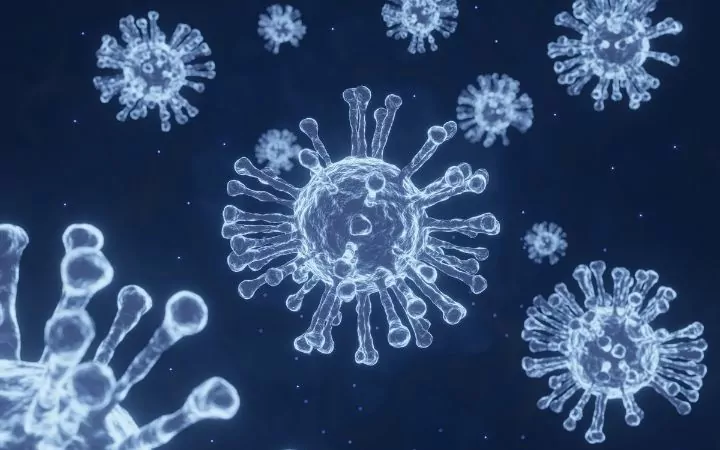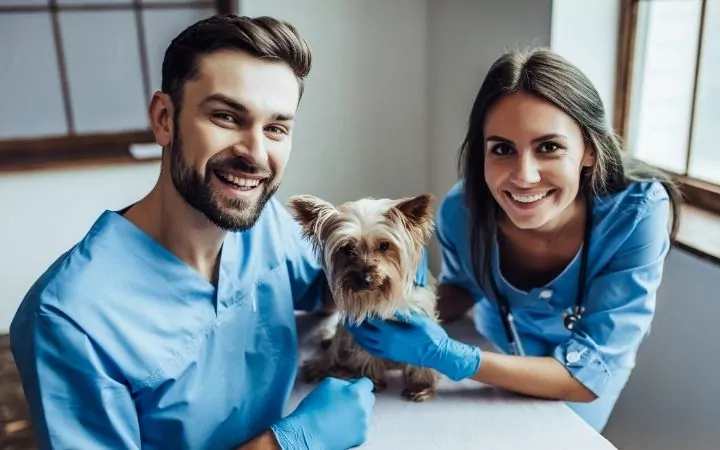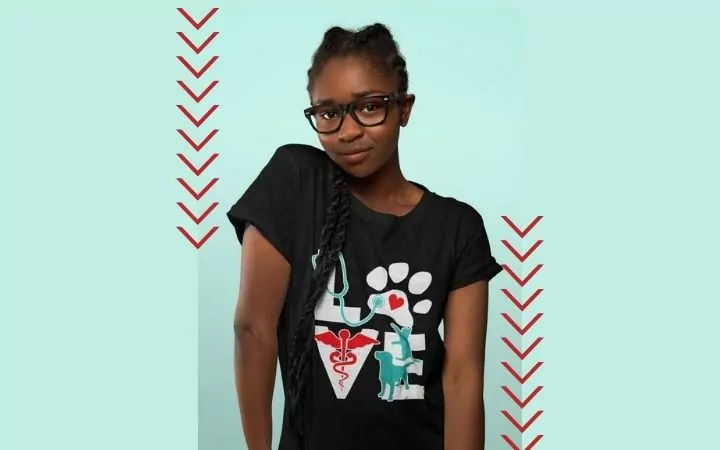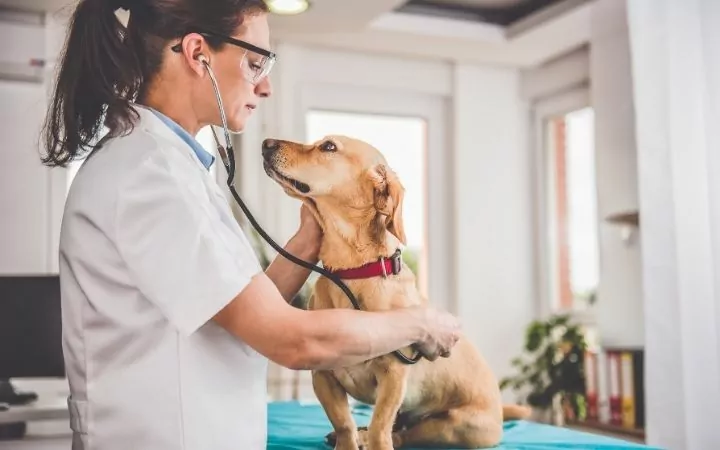Combating the disease is obviously not a veterinarians’ main job, but it does cross over a bit. It does this because Covid-19 was a disease that started off in an animal and mutated in a person. By educating the public on the dangers of zoonotic diseases, we can hopefully combat and prevent another pandemic from happening.
It’s also important to educate our clients and the public on the importance of vaccinations and why herd immunity is so vital. If we do so and encourage vaccination, we can help out on our end, and hopefully, it transfers to human relations.
We can refer to One Health, a collaborative organization that works at all levels to achieve optimal health. They do this by addressing that we must recognize that animals, plants, and humans, are connected and affect each other.

What Does the Future Hold for Veterinary Professionals in This Regard?
Technology for animal health is essential. We need to ensure access to more recent ways to improve and prevent infectious disease in order to provide a better future. This is especially important and relevant as we trudge through this pandemic.
By improving and studying animal disease, we can be more prepared for any future infectious disease outbreaks. We are preparing ourselves to have the best chance for any future issues. We can do this with proper monitoring and research.
How Veterinary Medicine Has Transformed in the Face of Covid
There have obviously been significant changes to the veterinary field and how we go about our day-to-day operations. In many practices, clients are still not being allowed to enter the building, and payments are still being taken over the phone and bloodwork, treatment plans, and surgical proposals.
Infectious disease is also being better sought after as well as known by our clients. Zoonotic diseases are now a better-understood term. The line between veterinary medicine and human medicine is becoming much thinner.
10 Way in Which Vets Can Celebrate and Participate in World Veterinary Day
So let’s celebrate! Wondering how? Below is a list of some fun suggestions you and your coworkers can get into this World Veterinary Day.
1. Register for a Webinar/ Seminar
In other years we would suggest going to continuing education meetings that focus on the theme at hand, but since we’re in a pandemic, it’s all virtual. But, virtual conferences and continuing education webinars are an awesome way to learn more about other veterinarians and how they are handling the pandemic.
2. Host a Luncheon
Nothing says thank you like some delicious food. Showing your staff, you appreciate them and their efforts goes a long way. During the luncheon, you can give each staff member specific cards that include why they are an essential part of the team and how thankful you are to have them.
3. Host a Raffle
Make it fun! Work should be fun, and let’s face it, the past year was pretty stressful. The prize could be flea/tick medication, a free examination, gift card to their favorite coffee shop. The possibilities are endless.
4. Open the Floor to Discussion
Veterinary leaders should be meeting with their staff regularly to discuss the ins and outs of their hospital, the cases, as well as discussing how they can improve. Focus this meeting on opening the floor to everyone involved. Keep it positive! There is always time for improvement and to discuss what we could’ve done better. For this meeting, discuss what the team did that was stellar and why.
5. Discuss with the Public
Since this year’s theme is The Veterinarian Response To the COVID-19 Crisis, open a discussion with your clients and others to discuss coronavirus. This can help educate the general public on the importance of vaccinations and how to prevent zoonotic diseases from spreading.

6. Make Infographics
Infographics are an awesome way to tap into your creative side as well as help educate the public and staff. Tapping into this year’s theme may be an infographic on common zoonotic diseases, how they are transmitted, how they are treated, and how we as a group can prevent them. Another fun infographic can be on the importance of vaccines, which is very relevant nowadays.
7. Spend Time Doing Things that you Love
This day is about you! So why shouldn’t you spend the day doing something you love. Of course, we can’t all take off on the actual day but pick a day nearby to enjoy yourself. Maybe you want to take a long hike, or perhaps you want to visit friends and family.
8. Take a day off
That’s right! We know you eat, breathe, and sleep veterinary medicine. However, you deserve and need days off to recoup. Need to catch up on sleep? Then sleep! Want to binge that show you’ve been dying to watch? Binge! Whatever your heart desires, you should do, but make sure you take some time away.
9. Kiss and Cuddle your Fur Babies
We would not be who we are without them! So take the time to give your pets the extra attention they need. You’ll find that the extra attention you’re giving them is really beneficial to both of you. After all, they are (most likely) a giant part of why you are in this field and why you do what you do.
10. Take a Poll
The new protocols are stressful for everyone, as change usually is. Asking your clients what you can improve on or what they like about them could help create a stronger bond and help improve owner compliance.

How Can Pet Owners Show Appreciation to Their Vet
Pet owners can do so many things to show appreciation to their vet. Read below for some ideas:
Take your pets in to see the Veterinarian Regularly!
Nothing makes veterinarians happier than healthy animals, and healthy animals are obtained through diligent pet owners who genuinely care about their pets. Keeping up on regular vaccinations, examinations, dental care, and bloodwork is a great way to show how much you appreciate your veterinarian.
Write a review
Word-of-mouth is the best way to help your veterinarian’s business grow. Just by referring their services to other pet owners is one of the greatest gifts you can give them. Using social media is another way to provide a positive word-of-mouth experience.
Donate to an Animal Charity
Veterinarians dedicate their life to helping your pets but, there are some pets they cannot reach. By donating to an animal charity, you are helping those animals.
Send coffee or lunch
Veterinarians need fuel to tackle their busy days and schedules. Food and coffee are excellent choices to help keep their stomach’s gas tank filled.
Buy a small gift
There are some great veterinary gifting ideas on our store here that you can select from.

Important Observances in the Veterinary World
Every year there are special days in the veterinary world that we can observe. Below is a list of important observances in 2021 from April-December.
- April 11- National Pet Day
- April 14- National Dolphin Day
- April 17- National Bat Appreciation Day
- April 25- World Penguin Day
- April 26- National Kids and Pets Day
- April 28- International Guide Dog Day
- April 30- National Adopt a Shelter Pet Day
- April 30- Hairball Awareness Day
- May 2-8- National Pet Week
- May 2-8- Be Kind to Animals Week®
- May 3- National Specially-abled Pets Day
- May 8- National Animal Disaster Preparedness Day
- May 8- Migratory Bird Day
- May 21- Endangered Species Day
- May 23- World Turtle Day
- June 4- Hug Your Cat Day
- June 6-12- Pet Appreciation Week
- June 9- World Pet Memorial Day
- June 25- Take Your Dog to Work Day
- July 4-10- National Farriers Week
- July 6- World Zoonoses Day
- July 14- Shark Awareness Day
- July 15- Pet Fire Safety Day
- July 31-National Mutt Day
- August 8- International Cat Day
- August 22- National Bring Your Cat to the Vet Day
- August 26-International Dog Day
- September 12-18- National Farm Health and Safety Week
- September 19-25- National Deaf Dog Awareness Week
- September 22- National Elephant Appreciation Day
- September 26 – October 2- Sea Otter Awareness Week
- September 28- World Rabies Day
- October 4- World Animal Day
- October 13- National Pet Obesity Awareness Day
- October 17-23- National Veterinary Technician Week
- October 21- Reptile Awareness Day
- October 29- National Cat Day
- November 1-7- Bird Health Appreciation Week
- November 7-13- National Animal Shelter Appreciation Week
- December 4- World Wildlife Conservation Day
Why a Career in Veterinary Medicine is Important
Veterinary medicine is not just important; it’s essential. We think the pandemic proved to be that veterinary hospitals were allowed to stay open. Now more than ever, we need to keep encouraging our youth to explore a career in veterinary medicine.
As long as we have animals, we need veterinarians. It’s also important to note that veterinary medicine has a tie to human medicine. Many animal diseases overlap with human diseases. Also, animals play an enormous role in studying and learning about infectious diseases.

The Different Types of Veterinarians
Deciding to be a veterinarian can be an incredibly overwhelming experience. Like with human medicine, there are a ton of different paths you can take, with a ton of different specialties. Below is a list of the different types of veterinarians there are:
- Companion Veterinarian: perhaps the most well-known veterinarian is the companion veterinarian. These veterinarians see all types of domestic pets, mainly dogs and cats. They also see pocket pets such as hamsters, gerbils, guinea pigs, birds, ferrets, and reptiles.
- Livestock/Large Animal Veterinarians: Large animal veterinarians see mainly domesticated farm animals, but they can split and specialize in individual areas such as poultry, dairy, equine, goats, and pigs.
- Zoo Veterinarian: Zoo veterinarians specialize in the treatment, care, and handling of exotic wildlife that is held in captivity.
- Research Veterinarian: Research veterinarians work to educate those practicing to be veterinarians and seek better ways to treat, diagnose animal disease and human health problems.
- Exotics: Exotic veterinarians specialize in exotic species that are kept as pets. These species include (but are not limited to) ferrets, birds, reptiles, chinchillas, frogs, sugar gliders, hedgehogs, potbellied pigs, hamsters, gerbils, and guinea pigs.
- Lab Animal: Lab animal veterinarians are responsible for the welfare and humane treatment of animals needed for the greater good of science.
- Mixed Practice: Mixed practice veterinarians are veterinarians who work with more than one type of specialty. For example, some veterinarians work with both small animals and horses.
- Wildlife Veterinarian: Wildlife veterinarians specialize in the care and well-being of wild animals.
